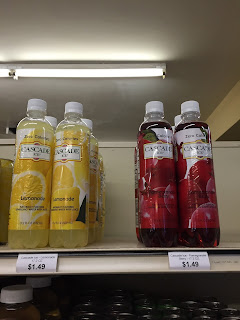 |
| These were plastic bulk bins I hand-washed two weeks ago while in the humid, hot backroom to the Arroyo Food Co-op...after rinsing them with eco-grade soap, I allowed them to air dry... |
1. What has worked well for you concerning senior project this year? What has made it a positive experience for you?
- The thing that has most worked well for me during this senior project of mine has been my developing ability in making personal relationships with the people around me. Doing so has not only enabled me to gather the information and first hand experience I need to isolate my definition of urban farming as my senior thesis, but has also instilled in me a habit of making friends with those of a profession of interest to me. Making such connections in life will, as I predict, help me become situated in a career and become comfortable in what I has to offer me my pursuits in science and beyond. I do hope the people I meet today will give me advice for my own future so that I may enter adulthood a sage and experience as a second party to another person’s trials and tribulations. I love the idea of layering my successes atop the learnt life skills of others and having others - future younglings - layer their own moments of pride atop my future failures sure to come. One example of how I have come to familiarize myself with this interspecies style of collaboration are my brief conversations with Nikki, Erin, and Kelly as I work in my mentorship at the Arroyo Food Co-op, and how they have made my working more enjoyable and less demanding than if I were an ignored shop-keeper hidden away while stocking shelves. In being a part of the community surrounding the food revolution urban farming brings to the store, I have associated my mentorship as a positive experience. I have come to appreciate being around people who are in the same position as me, bringing about a revived prominence for urban farming. I have also come to appreciate how I am constantly around people who at any point in time can offer me advice for another direction in my senior project.
2. What are you finding difficult concerning senior project? How can you adapt to make that portion work better for you? How might the senior team help?
- The most difficult challenge that has confronted me constantly throughout my senior project has been widening the scope of my exploration into urban farming to include how it can be physically analyzed and its relation to the earth. To this end, I have been looking to intern at an urban farm and so learn the techniques necessary to farm effectively and thus make urban farming tethered as an idea to reality. I desire so very much to see fruit and vegetables growing in trees and on vines, and to see how this grown bounty is brought into existence so that it may be placed on shelves like those I stack for consumption at the Arroyo Food Co-op. To see the assembly line urban farming relies on is my goal, and I now only need to gather up the gumption involved in sending emails to unknown persons at novel workplaces rooted in the dirt. Doing so I hope will lead me to another mentorship at either Savadoya Farm or Earthworks, which could actually provide me with my very own garden plot. In this way, I will adapt by learning to be fearless with my ‘hunt’ for my questions in regards to how to define urban farming - a task necessary if I ever hope to think of an essential question! The senior team will be essential if I intent to make sure that I am not being overly ambitious at any given point during my project’s trajectory, acting as a sort of reality check with a continued advisory prep sessions and hopefully individual conversations. This team creed will act to settle another stimulus of my worries: my fear of not meeting certain criteria required for P grade consideration.









